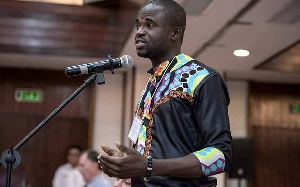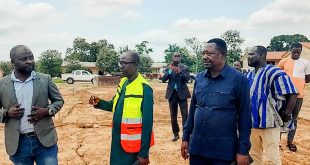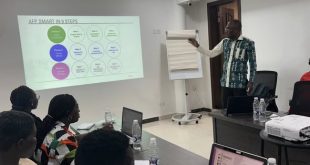Investigative journalist, Manasseh Azure Awuni, has published an article to detail events leading to the woes of the Auditor-General, Daniel Yao Domelevo, and a directive from the Presidency forcing him to proceed on leave.
The award-winning journalist explains that the public manifestation of the acrimonious tussle between Domelevo and the government that resulted in the Auditor-General’s woes can be traced to work done by the Audit Service on the Ministry of Finance.
“It started when the Auditor-General issued an audit observation dated January 21, 2019, to the Ministry of Finance after an audit revealed that the Ministry of Finance had paid a UK-based investigation firm, Kroll Associates, an amount of $1,031,460.50 but there was no evidence of work done.
“What caught the attention of the auditors was that the contract between the government and Kroll Associates was signed in September 2017, but ‘invoices include February, May, June and August 2017, an indication that Kroll Associates Ltd commenced work 7 months before the actual contract,’” Manasseh Azure Awuni writes in his latest article.
Read the full article below.
The Full Drama of How Ghana’s President hounded the Auditor-General out of Office
By Manasseh Azure Awuni
An “Anti-Corruption President” Stands Accused
In 2016, Nana Addo Dankwa Akufo-Addo of the opposition New Patriotic Party (NPP) won Ghana’s election convincingly mainly because of his avowed pledge to fight corruption. He promised to set up the Office of the Special Prosecutor to prevent, investigate and prosecute those engaged in corruption.
Less than two weeks to another election in which he is seeking to be re-elected, the man President Akufo-Addo appointed as the first Special Prosecutor of Ghana has resigned from the office and alleged that the president was interfering in his duties.
In his resignation letter to the president, Martin Amidu, a former Minister of Justice and Attorney General in Ghana and one of Ghana’s most respected anti-corruption crusaders, said the President “had laboured under the mistaken belief that I could hold the Office of the Special Prosecutor as your poodle.”
Martin Amidu, in a follow-up release, said President was “really the mother corruption serpent.”
Long before Martin Amidu’s resignation and accusations, which the president has denied, some person and civil society groups had raised concerns about not only the growing levels of corruption in the Akufo-Addo government but also the attempts to undermine institutions and individuals fighting corruption.
On December 9, 2019, Denmark’s Ambassador to Ghana, Tove Degnbol said, “It is particularly sad to see that certain public institutions are doing their utmost to put hindrances in the way for integrity institutions such as the Auditor-General’s Office and the Office of the Special Prosecutor on anti-corruption”.
She added: “As we are approaching an election year, the attacks against integrity institutions and individuals contributing to fight corruption seem to be on the increase. This is noted with a lot of concern by many in the international community.”
The Woes of the Auditor- General Begin
The woes of the Auditor-General of Ghana, Daniel Yaw Domelevo, became public when he petitioned President Akufo-Addo in a letter dated July 27, 2018. It was a complaint against the board chairman of the Audit Service, Professor Edward Dua Agyeman, and the board of the Audit Service. The Auditor-General said the board chairman and the board were interfering in and undermining his functions.
Article 187 (7) (a) of Ghana’s Constitution states: “In the performance of his functions under this Constitution or any other law the Auditor-General- shall not be subject to the direction or control of any other person or authority.”
The Auditor-General among others said the board chairman of the Audit Service was manipulating a procurement process, had attempted to commission an audit, and interfered with an audit process.
The President said a committee would be set up to investigate the complaint made by the Auditor-General, but that did not happen.
The Senior Minister and Kroll Associates
The public manifestation of the acrimonious tussle between the Auditor-General and the government that resulted in the hounding of the Auditor-General out of office can be traced to work done by the Audit Service on the Ministry of Finance.
It started when the Auditor-General issued an audit observation dated January 21, 2019 to the Ministry of Finance after an audit revealed that the Ministry of Finance had paid a UK-based investigation firm, Kroll Associates, an amount of $1,031,460.50 but there was no evidence of work done.
What caught the attention of the auditors was that the contract between the government and Kroll Associates was signed in September 2017, but “invoices include February, May, June and August 2017, an indication that Kroll Associates Ltd commenced work 7 months prior to the actual contract.”
It later emerged that the payments were made before the contract was signed based on a letter of intent dated February 7, 2017. That letter listed the four “objectives” for engaging Kroll Associates as:
1. Recovering assets from identified wrongdoers both domestically and internationally;
2. Investigating allegations of wrongdoing, and providing evidence assets recoveries and possible prosecution;
3. Building capacity for the transfer of skills, and supporting Ghana in efforts to reduce corruption;
4. Advising on preventive techniques structures to prevent corruption and asset dissipation.
That letter of intent said, “Kroll’s fees will be paid against the value of assets Kroll has identified and secured. A first phase will prove the validity of the concept by the early securing of assets and that will contribute to the cost of further phases of Kroll’s work.”
The contract was later signed on September 29, 2019, and set the fees for Kroll’s service at an hourly rate of $140 for the lowest official and $750 per hour for the topmost official.
The contract was signed by the Senior Minister, Yaw Osafo-Maafo, but payment was being made by the Ministry of Finance, the ministry whose audit brought about the transaction.
The contract said, “Invoicing will take place on a monthly basis. Kroll will provide fortnightly updates on progress and fees and only invoice for work which has been done.”
The Auditor-General found a number of issues with the contract. One of them was that the contract had no approval from the Public Procurement Authority (PPA) even though it was single-sourced and the law required approval by the PPA.
The Auditor-General also said the contract was an international one and had to be approved by parliament as mandated by the Constitution of Ghana. That had not been done.
The main problem, however, was that there was no evidence of work done.
The Auditor-General’s contention is that if the work was to be done and invoiced based on the number of hours and actual work done, it was strange that the estimated contract sum was exactly what was paid.
The audit team, therefore, needed the fortnightly updates of work done and invoices for which the calculations came to the exact amount agreed as the estimated contract sum.
Audit Queries and Responses
The Auditor-General’s “Audit Observation Memoranda” dated January 21, 2019, got a response from the Ministry of Finance, which said, “Observation well noted. Management will make available the report as requested.”
The Ministry of Finance, however, did not make available the response and evidence of work done so the Auditor-General wrote back to the Ministry in an audit management letter dated March 1, 2019. A person or entity served with an audit management is expected to respond within 30 days.
The Finance Ministry responded in a letter dated June 11, 2019, saying, “The relevant documents are available for audit review. A team outside the Ministry of Finance is carrying out the assignment. We have spoken to the team leader and they are ready to share relevant information.”
Again, the Finance Ministry did not provide any information on the documents or evidence of work done so the Auditor-General then went ahead to issue the audit report in June 2019. This meant the audit had ended.
In August, the Finance Ministry wrote to the Auditor-General and attached a letter from the Senior Minister. The letter signed by the Senior Minister, Yaw Osafo-Maafo and dated August 23, 2019, said it was in response to the Finance Minister’s letter dated “22nd August 2019 requesting me to provide any available evidence to support the status of contract performance by Kroll Associates UK Limited.”
The letter proceeded to give the background of the contract but without any evidence or document of work done by Kroll Associates. That letter was attached to a letter sent by the Finance Ministry to the Auditor-General dated August 28, 2019.
In another letter dated September 24, 2019, the Auditor-General served a notice of “intention” to disallow and surcharge the persons and organisations involved in the Kroll contract. The Auditor-General gave them the opportunity to explain why they should not be made to refund the $ 1,031,460.50, being the amount paid in respect of the contract.
According to the Auditor-General, the responses provided were not satisfactory. Kroll Associates did not respond.
The Auditor-General then served a “notice of specification and certification of disallowance and/or surcharge” on the Senior Minister, Yaw Osafo-Maafo; Kroll and Associates and four officials of the Ministry of Finance. They were to pay GHc 4,869,421.87, being the cedi equivalent of the $ 1,031,460.50 and a surcharge of GHc640,931.73 making a total of GHc 5,510,353.73.
The Auditor-General reminded them that they had an option to appeal the surcharge and disallowance at the High Court within sixty (60) days if they disagreed with it, which they did.
In the appeal, they argued that the Auditor-General did not give them a fair hearing and that the issue about the parliamentary approval as well as the approval from the PPA were not raised by the Auditor-General in Audit queries and in the final audit.
Lawyers for the Auditor-General argued that these issues formed the basis of the initial queries and since the parties were not contesting the illegality, it should not be entertained by the court.
The main issue, however, was whether there was evidence of work done or not.
Drama at the High Court
At the high court, the Senior Minister argued that after he received the notice of the intention to disallow and surcharge, he invited the Auditor-General to inspect the documents and evidence of work done, but the Auditor-General failed to do so.
The Auditor-General argued that if that evidence was available, it would have been made available to the audit team while the audit was still ongoing and not after the audit had been completed.
The Senior Minister’s argument was that the evidence had not been made available to the Auditor-General because it was confidential and prejudicial to national security.
The Auditor-General argued that the issue about confidentiality and national security nature of the information was an afterthought when the Senior Minister realised that he was going to be surcharged and he had no reasonable excuse to give. According to the Auditor-General, when the Audit Observation was made in January 2019, the issue of the confidential nature of the information did not come up.
Again, when the management letter was issued in March 2019 and evidence of work done was sought, the issue of National Security did not come up. Even in the August 2019 responses from the Senior Minister and Finance Ministry after the Audit was completed, the issue of National Security did not come up.
Another reason the Auditor-General said he could not go to inspect the documents after the audit was completed was that it breached the procedures of auditing and would set a bad precedent.
“What that means is if a public officer is given money to buy ten cars and the auditors go and could not find the cars and he cannot explain and the audit is completed, he can ignore them and when they are about to surcharge and disallow, he can go and buy the cars and say come and look at it,” he explained in an interview.
The Auditor-General also disputed the claim that the documents were prejudicial to national security because the Senior Minister had said he shared that information with the Economic and Organised Crime Office (EOCO), the Ghana Cocobod, and had copies himself. If all these institutions had copies, then the Auditor-General, who is supposed to audit all these institutions could not be exempt from it, he argued.
Besides, Article 187(3) of Ghana’s Constitution states that “the Auditor-General or any person authorised or appointed for the purpose by the Auditor-General shall have access to all books, records, returns and other documents relating or relevant to those accounts.”
More Drama at the Supreme Court
The High Court referred the matter to the Supreme Court to determine whether or not the evidence of work done was confidential and prejudicial to national security.
But the Supreme Court did not determine the matter that was referred to it by the lower court.
When the case was called, the lawyer for the Senior Minister told the Supreme Court that the Senior Minister was prepared to show the evidence of work done to the Auditor-General. The lawyer for the Auditor-General argued that that was not the reason they were in the Supreme Court, and that the only reason they were there was to get a ruling as to whether the said evidence or information was confidential and prejudicial to national security for which reason it was kept away from the Auditor-General when the audit was being conducted.
The Supreme Court ruled that the Auditor-General should go and inspect the documents and evidence the Senior Minister was making available and report back within ten days from June 24, 2020.
The failure of the Supreme Court to rule on whether the reports on evidence of work done meant that the senior minister did not have to prove how asset recoveries and detailed fortnightly reports from Kroll Associates was deemed as privileged information and prejudicial to national security.
It also meant that at the High Court, the Senior Minister would not have to explain why he kept the evidence of work done from the Auditor-General in the period of the audit. That information would have been necessary if the Supreme Court had ruled that the information was not highly confidential and prejudicial to national security.
At this stage, the Senior Minister still had to convince the Auditor-General that the documents to be inspected were satisfactory, that it contained all the billing hours and the amount of work done to merit the payment of the full amount.
But the Auditor-General would not be in office to oversee the inspection.
The Presidency Intervenes
On June 29, 2020, President Akufo-Addo ordered the Auditor-General to proceed on 123 days accumulated leave with effect from July 1, 2020. The Auditor-General wrote to the President arguing that there was nothing like “accumulated leave” and if there was any outstanding leave, then it was the leave for 2020, which he was undertaking as a sign of respect to the presidency.
The presidency responded by adding 44 days to the 123 days, making a total of 167 working days of compulsory leave, with effect from July 1, 2020.
The Auditor-General in a letter to the president said he believed he was being asked to step aside because of the case against the senior minister. The Senior Minister is an influential member of the government. The Minister of Finance, whose ministry paid the money to Kroll Associates, is also the cousin of the president.
Lawyers and civil society organisations condemned the decision by the president, saying it undermined the authority and independence of the Auditor-General. Some public interest individuals and civil society organisations have taken the matter up at the Supreme Court.
Some labour experts said if a public officer does not go on leave in a particular year, he or she forfeits it and there’s nothing like accumulated leave. Others also questioned why the president’s political appointees who had never gone on leave were not touched.
A cabinet minister told this reporter that the government’s problem with the Auditor-General was that he would not subject himself to the control of the board. Another questioned why he was interested in investigating the current government and not the many scandals of the previous government.
Interestingly, the board chairman of the Audit Service, whom the Auditor-General was expected to take orders from, works in the office of the Senior Minister, who the Auditor-General is auditing. In fact, the board Chairman of the Audit Service represented the senior minister in court in the case against the Auditor-General.
Back to the Supreme Court and High Court
On July 2, 2020, a day after the Auditor-General was forced to proceed on leave, the man appointed by the President to act as the interim Auditor-General inspected the documents and said he was satisfied with what he saw.
The Supreme Court then wrote back to the High Court:
“Having informed the Court that the special confidential documents, which necessitated the Learned Trial Judge to make a reference to this court have been inspected by a team from the Audit Service, representing the Acting Auditor-General and found same to be satisfactory, this court is of the view that the reference to the Court is moot and the reference is accordingly struck out.”
In the High Court Judgement, Justice Afia Serwaa Asare Botwe said the Auditor-General did not give those involved the right to be heard. On the substantive matter of whether work was done for which the payment was made, the Judge wrote:
“Eventually, however, when the matter was referred to the Supreme Court, not only did the Respondent’s office now agree to inspect the documents, they also expressed satisfaction with the work done.”
All the appeals from the five government officials and Kroll Associates were “upheld on all grounds” and no one has been held responsible for the Kroll Associates deal.
Source: www.ghanaweb.com
 Home Of Ghana News Ghana News, Entertainment And More
Home Of Ghana News Ghana News, Entertainment And More





